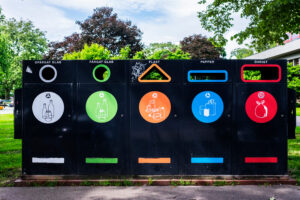Sweden offers innovative solutions and extensive know-how in waste collection and recycling. We are the global leader when it comes to dealing with and recycling waste. The waste-to-energy systems we have developed have given waste a value.
Sweden has extensive and efficient waste management systems in place, and municipal waste in landfills is almost non-existent. About 99,3 % of all household waste is recycled or recovered as energy, putting Sweden at the top in this area.
This success results from the combination of effective waste management policies, advanced infrastructure, citizen participation, and the use of sustainable practices.
Waste as a resource

Image by Simon Paulin/imagebank.sweden.se
Our waste is treated in integrated systems and recycled for district heating, electricity, biogas, biofertilizer, and materials. Different treatment methods are used depending on the nature of the waste so as to make it possible to use the waste as a resource.
Incineration is a method ideally suited to waste that cannot be recycled in any other way. It is an efficient and environmentally safe method for recovering energy from waste and provides both district heating and electricity in Sweden.
Sweden recovers more energy from each tonne of waste than any other country.
Our waste management systems are being developed continuously, and are the result of long-term, persevering work, in particular on the part of municipalities and their companies in cooperation with private players. It has required risk-taking to develop new technologies and taken courage to make large, but essential, investments in infrastructure.
Sweden’s vision of ‘zero waste’ permeates all levels of its waste management and the collection of source-separated food waste.